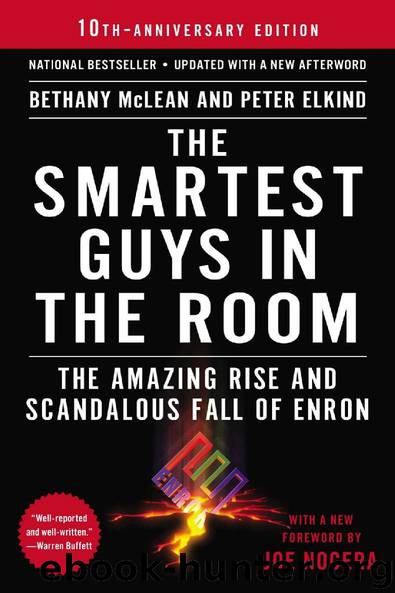The Smartest Guys in the Room: The Amazing Rise and Scandalous Fall of Enron by Bethany McLean & Peter Elkind

Author:Bethany McLean & Peter Elkind [McLean, Bethany]
Language: eng
Format: epub
Publisher: Penguin Group US
Published: 2013-11-26T00:00:00+00:00
CHAPTER 15
Everybody Loves Enron
At practically every employee meeting in the late 1990s, Ken Lay would trot out what he once described as “one of my most favorite slides.” The slide compared Enron’s stock performance against that of the S&P 500 during the 1990s. It was, unquestionably, a glorious sight to see, and one that only got more glorious with almost every passing quarter. By May 1999, Enron had returned over 600 percent to its investors, one and a half times the return of the market’s most important index. By early 2000, Enron’s return had hit 1,000 percent. And by October 2000, Lay’s favorite slide showed that Enron had returned a stunning 1,400 percent since 1990, more than three times the gain of the S&P 500.
Enron’s stock slump of 1997 was ancient history. In the heady days of the late bull market, it was hard to recall a time when Enron’s stock hadn’t gone straight up. In August 1999, with the stock closing in on $88 a share, the company announced a two-for-one split, its first since 1993. For the year, Enron stock returned a startling 58 percent.
Enron’s ever-rising share price, of course, was serving as the underpinning for the many special-purpose entities Andy Fastow and his Global Finance underlings were devising to help the company raise capital and hit its quarterly earnings targets. It had a number of other consequences as well. At the tail end of a bull market that had run for nearly a decade, any company with a flashy stock chart and an eye-popping price-to-earnings ratio took on an aura of invincibility, none more than Enron. “Enron is literally unbeatable at what they do,” raved David Fleischer, a securities analyst at Goldman Sachs. “The industry standard for excellence,” chimed in Deutsche Bank’s Edward Tirello. “Enron is the one to emulate,” wrote the Financial Times.
Any remaining vestiges of skepticism were washed away in the torrent of praise that showered over the company and its top executives. Enron’s nearly incomprehensible financial statements? Nobody worried about them. The related-party transactions buried in the footnotes? Who bothered with footnotes? That Skilling himself sometimes seemed unable to give a coherent explanation of Enron’s business—at times, he got by with saying “We’re a cool company”—bothered no one. All that mattered was that the stock was going up. Because the stock was rising, Enron’s executives were seen as brilliant. Because they were viewed as brilliant, all their new ideas had to be winners. “They had the aura of whiz kids, of golden boys who could do no wrong,” says Thomas Kuhn, the president of the Edison Electric Institute, the powerful trade association for the nation’s electric utilities. Skilling and Lay found themselves mentioned in the same breath as GE’s Jack Welch, Microsoft’s Bill Gates, Apple’s Steve Jobs, and the very small handful of other celebrity businessmen.
The people inside Enron were as caught up in the frenzy as any outside investor. It was fun to read the stories about how smart they all were. Because
Download
This site does not store any files on its server. We only index and link to content provided by other sites. Please contact the content providers to delete copyright contents if any and email us, we'll remove relevant links or contents immediately.
The Social Psychology of Inequality by Unknown(3037)
The Plant Paradox by Dr. Steven R. Gundry M.D(2627)
The Writing on the Wall by Anselm Jappe(2049)
Working for Yourself by J.D. (Nolo) Stephen Fishman(1875)
Get What's Yours for Medicare by Philip Moeller(1755)
Every Landlord's Legal Guide by Janet Portman & Stewart Marcia & Ralph Warner(1677)
The First 20 Hours: How to Learn Anything ... Fast by Kaufman Josh(1671)
ADHD on Trial by Michael Gordon(1582)
Decisive by Chip Heath(1571)
Working for Yourself by Stephen Fishman J.D. (Nolo)(1533)
Drafting Contracts: How and Why Lawyers Do What They Do, Second Edition by Stark Tina L(1500)
A Practical Guide to International Arbitration in London by Hilary Heilbron(1445)
The Lord of the Rings: The Fellowship of the Ring, the Two Towers, the Return of the King by J. R. R. Tolkien(1445)
The Economist Aug 8th 2015 by The Economist(1434)
Restitution by Restitution(1431)
Intellectual Property Strategy by John Palfrey(1428)
The Economist Aug 29th 2015 by The Economist(1396)
Collusion by Luke Harding(1326)
Persuasion by Owner(1303)
